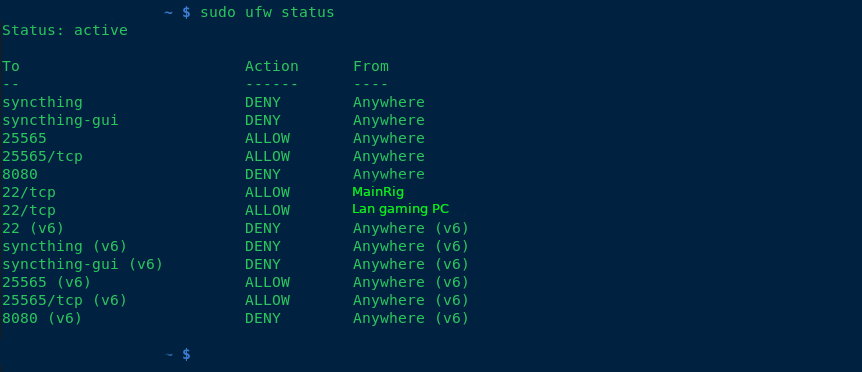So i’ve been hosting a modded Minecraft server for my friends and me on weekends. While it’s been a blast, I’ve noticed that our current setup using LAN has its limitations. My friends have been eagerly waiting for their next “fix” (i.e., when they can get back online), and I’ve been replying with a consistent answer: this Friday.
However, exploring cloud providers to spin up a replica of my beloved “Dog Town” Server was a costly endeavor, at least for a setup that’s close to my current configuration. As a result, I’ve turned my attention to self-hosting a Minecraft server on my local network and configuring port forwarding.
To harden my server, I’ve implemented the following measures:
- Added ufw (Uncomplicated Firewall) for enhanced security.
- Blocked all SSH connections except for the IP addresses of my main PC and LAN rig.
- Enabled SSH public key authentication only.
- Rebuilt all packages using a hardened GCC compiler.
- Disabled root access via
/etc/passwd. - Created two users: one with sudo privileges, allowing full access; the other with limited permissions to run a specific script (
./run.sh) for starting the server.
Additionally, I’ve set up a fcron job (a job scheduler) as disabled root, which synchronizes my Minecraft server with four folders at the following intervals: 1 hour, 30 minutes, 10 minutes, and 1 day. This ensures that any mods we use are properly synced in case of issues.

any suggestions of making the computer any more secure, aswell as backup solutions? thanks!
–added note, what hostnames do you guys call your servers? I used my favorite band albums and singles for hostnames.


IMO the biggest attack vector there would be a Minecraft exploit like log4j, so the most important part to me would make sure the game server is properly sandboxed just in case. Start from a point of view of, the attacker breached Minecraft and has shell access to that user. What can they do from there? Ideally, nothing useful other than maybe running a crypto miner. Don’t reuse passwords obviously.
With systemd, I’d use the various Protect* directives like ProtectHome, ProtectSystem=full, or failing that, a container (Docker, Podman, LXC, manually, there’s options). Just a bare Alpine container with Java would be pretty ideal, as you can’t exploit sudo or some other SUID binaries if they don’t exist in the first place.
That said the WireGuard solution is ideal because it limits potential attackers to people you handed a key, so at least you’d know who breached you.
I’ve fogotten Minecraft servers online and really nothing happened whatsoever.
Log4j is a Java logging library lolz
Yeah, that didn’t stop it from pwning a good chunk of the Internet: https://en.wikipedia.org/wiki/Log4Shell
That is an exploit OF log4j. Just pointing out the difference.